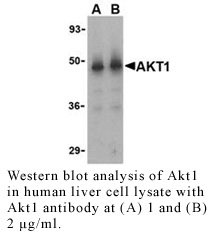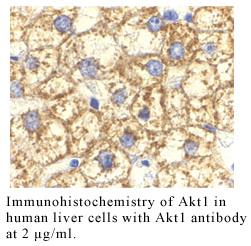Anti-Human Akt1
Data
- -
- -
Antibody DetailsProduct DetailsReactive Species Human Host Species Rabbit Immunogen PN:A279 Product Concentration 0.5 mg/ml Formulation This polyclonal antibody is formulated in phosphate buffered saline (PBS) pH 7.4 containing 0.02% sodium azide as a preservative. Storage and Handling This polyclonal antibody is stable for at least one week when stored at 2-8°C. For long term storage, aliquot in working volumes without diluting and store at –20°C in a manual defrost freezer. Avoid Repeated Freeze Thaw Cycles. Country of Origin USA Shipping Next Day Ambient RRIDAB_2828082 Each investigator should determine their own optimal working dilution for specific applications. See directions on lot specific datasheets, as information may periodically change. DescriptionSpecificity Rabbit Anti-Human Akt1 recognizes an epitope neat the N-terminus of human, mouse and rat Akt1. This polyclonal antibody was purified using affinity chromatography. Background Akt1, initially identified as the cellular homolog to the retro-viral oncogene v-Akt,1 is part of the phosphatidyl 3’-kinase (PI3K)-Akt signaling pathway that is activated by diverse cellular stimuli and regulates critical cellular functions such as cell growth, proliferation, and survival.2 Following phosphorylation of the second messenger PIP2 by PI3K, Akt1 translocates to the cell membrane where it is activated by phosphoinositide-dependent kinase (PDK) 1 and PDK2.3 The active Akt1 is then able to phosphorylate and activate its substrates, including those that are important for cell proliferation and survival such as TOR and the Bcl-2 homolog Bad.4 Negative regulation of the PI3K-Akt signaling pathway is mainly accomplished by the lipid phosphatase activity of PTEN which catalyzes the conversion of PIP3 to PIP2, thereby preventing the activation of Akt1. Inactivation of this gene often results in excessive Akt1 activity, often leading to the formation of malignant tumors. Antigen DetailsPubMed References & Citations1. Bellacosa, A. et al. (1991) Science 254:274 2. Song, G. et al. (2005) J. Cell. Mol. Med. 9:59 3. Alessi, DR. et al. (1996) EMBO J. 15:6541 4. Nave, BT. et al. (1999) Biochem. J. 344:427 Technical Protocols |
Related Products
 Products are for research use only. Not for use in diagnostic or therapeutic procedures.
Products are for research use only. Not for use in diagnostic or therapeutic procedures.




